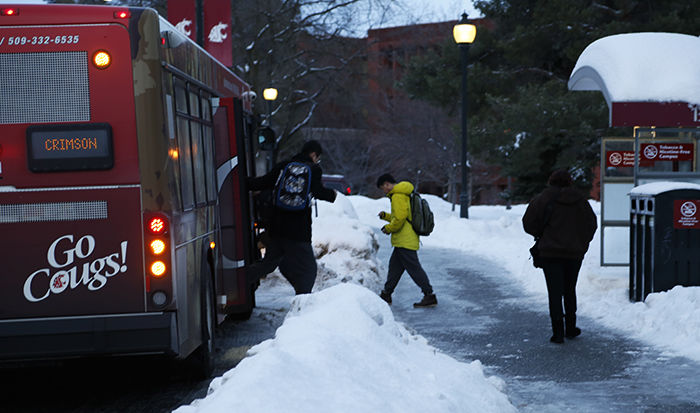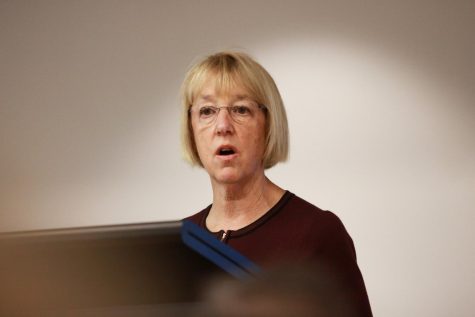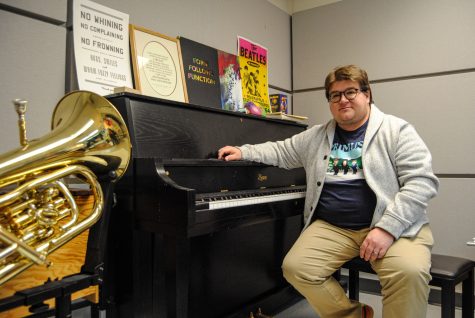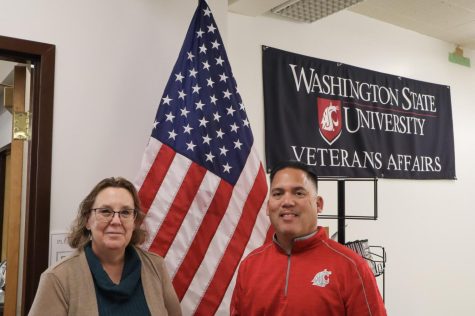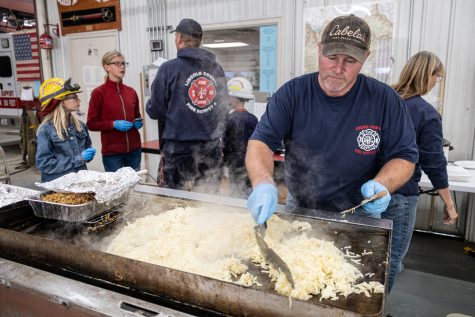Weather causes problems for transit
January 24, 2017
It’s Monday morning and you’re waiting in line at the bus stop, bundled in a parka and dreading your 8 a.m. class. You watch as a bus passes, its sign flashing “bus full.”
Then another passes. And another.
Pullman Transit Manager Wayne Thompson has heard this complaint repeatedly since WSU’s spring semester began on Jan. 9.
“We’re working on a strategy with that, by telling our drivers to leave room for the passengers further down the road,” Thompson said. “It’s just tough for our driver to tell people ‘no, you can’t board,’ when they’re standing there waiting for you to show up.”
Despite this, Thompson said riding the bus is a more viable option than walking or driving yourself.
“I’d much rather be on a warm bus than waiting at a stop or walking, and it’s hard on any vehicle to start and drive in sub-zero temperatures,” he said. “Of course, contrary to that, it’s not safe to sit and wait and watch two or three buses go by, which I know is frustrating for students.”
In order to alleviate pressure on the Express route, which serves the area of Pullman colloquially referred to as Apartment Land, Pullman Transit officials have applied for a grant package, Thompson said.
The package would extend the morning Express Shuttle service by an hour so that it would run between 8 and 10 a.m., which are peak class times, Thompson said. It also requests enough funding to provide Sunday service, an addition students have been requesting for years.
Pullman Transit applied for the grant through the state, but it uses mostly federal money, Thompson said. He said he would be able to find out if Pullman Transit has been awarded the package as early as March.
Elizabeth Collins has been a Pullman Transit Express driver for two years, but said she has never driven a bus in weather like this before.
“It hasn’t been terribly difficult,” Collins said. “You just have to go slow and pay attention. The snow is fine, it’s just the ice that’s the problem.”
Pullman Transit drivers have been working together to coordinate routes over their radios to cope with increased ridership, she said.
“We communicate with each other to better space the buses so we don’t leave as many people behind,” Collins said. “We just kind of drive, that’s really all we can do.”
Greg Johnson, 67, has been a bus driver in Pullman for 20 years, but the last time he dealt with weather this bad was in 2010.
“The snow was so heavy they had to close WSU,” Johnson said. “The reason was because the snow had gotten so bad, and the ice had formed underneath it and they simply couldn’t put enough gravel down.”
A similar scenario prompted WSU President Kirk Schulz to close the campus on Wednesday, as ice accumulation presented safety concerns for pedestrians, according to a campus-wide email from Michael Gaffney, director of the Office of Emergency Management.
Gravel—which gives the wheels traction—is critical to driving any vehicle during Pullman winters, especially buses, Johnson said.
“If it’s snow, go slow, if it’s slick, get gravel,” he said. “We live and die on the gravel because we don’t put chains on the tires—we just don’t have the manpower to get the chains on and off after the snow goes.”
Johnson said driving a commercial vehicle during inclement weather is hard on transit drivers, both mentally and physically.
“When you’re out there your number one job is concentration and concentration requires energy—you’re spending a lot of it on thinking ahead and trying to keep out of trouble,” Johnson said. “You also spend a lot of time bouncing around and get a backache from it. I have slept very well for the last week; it’s like, ‘Oh man, I am tired.’”
All in all, Johnson said the trouble is worth it—especially since students voted to add a mandatory transit fee in spring 2003.
“Without that student money, we would have three buses in Pullman,” Johnson said. “So we love students — we were shocked when they taxed themselves. We’re just extremely grateful that the students thought this was worth funding.”


